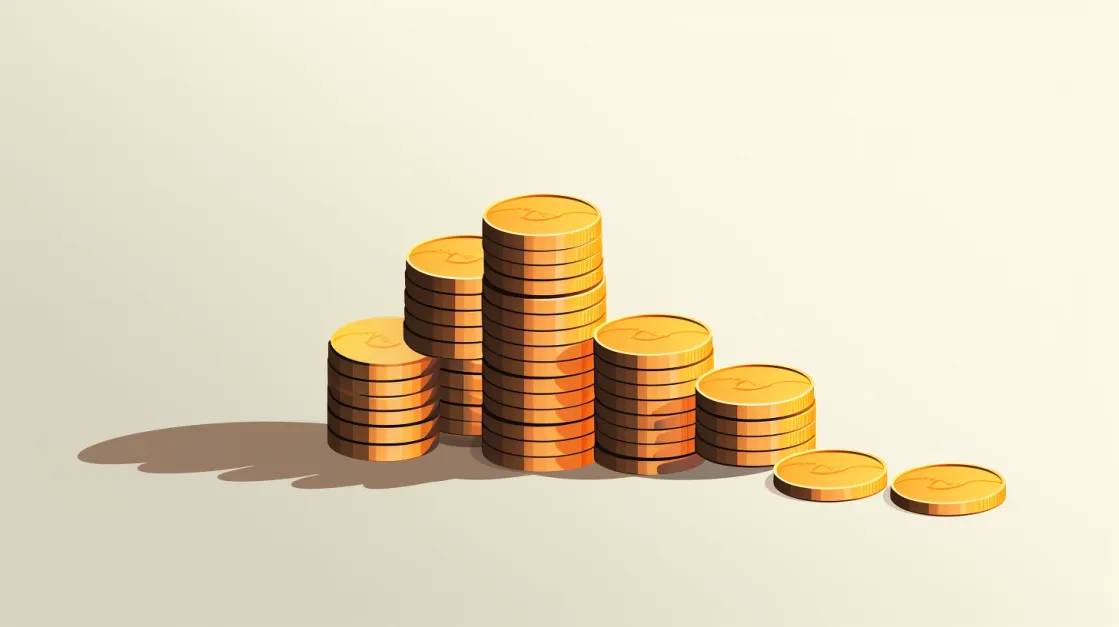How Does Inflation Affect Retirement Savings?

Understandably, you might be looking at your hard-won retirement savings and wondering how it’ll fare against the relentless pace of inflation. I get it – a few moons ago, I too had those identical reservations swirling in my head.
Only after delving deep into the intricate world of Economic and Federal Reserve data did things start making sense to me. Now armed with some pretty insightful nuggets of information about safeguarding your nest egg from this elusive creature we know as inflation, I’m eager to share them with you all.
Don’t worry; consider me your co-navigator as we weather this storm together!
Key Takeaways
- Inflation takes away the worth of money. It makes goods cost more. It can hurt your retirement savings.
- Inflation can eat into Social Security, pensions, and other fixed incomes for retirees.
- There are ways to plan for inflation. You can adjust your savings plan or invest in options that fight inflation.
- Diversify your investments and stay flexible with spending to lessen the impact of high prices on retirement savings.
Understanding Inflation

Inflation is like a slow leak in your wallet. It’s the rise in cost for items and services over time. Think of it this way, today you pay more money for the same loaf of bread than ten years ago.
That’s inflation at work! The Bureau of Labor Statistics keeps an eye on these price hikes by tracking the Consumer Price Index (CPI). This index tells us about the speed at which prices are going up.
While it might seem small, even low rates of inflation can hurt your money’s power over many years. For example, during my 30-year career, a two percent annual increase in prices brought down my dollar’s worth to just 55 cents! So imagine how it eats into retirement savings when folks are not working anymore.
Did you know? Retirees oftentimes face higher inflation rates than others since they use more health care and live longer after retiring!
How Inflation Impacts Retirement Savings
Inflation can chip away at your retirement savings! Here’s how: it reduces purchasing power, meaning your dollars buy less today than before. It also erodes the value of fixed income, impacting annuities and pensions tied to these rates.
Moreover, inflation may increase cost of living – making healthcare, housing, and travel more expensive in retirement than when you were planning for it.
Decreased Purchasing Power
Inflation erodes the value of money. This means your dollar can buy less than it could before. This is called a drop in purchasing power. It’s like a thief that takes some of what you have saved.
Retirees often see this happen faster. Their income may stay the same while prices jump up. In no time, they find out they can’t pay for all their needs anymore! Even low inflation rates cause damage over years and years.
Retirees who live on fixed payments should watch out! They stand to lose the most as prices climb higher every year.
Erosion of Fixed Income
Your fixed income can take a hit from inflation. This means money that comes in every month, like pensions. The value of this income may go down over time because of rising prices.
It is like erosion washing away the soil on a hill over many years. At first, you might not notice it, but slowly the face of the hill changes and becomes less stable. The same thing can happen to your retirement savings if you’re only getting fixed income and prices keep going up due to inflation.
Now let’s say your pension was giving you enough cash each month for all your bills ten years ago when you retired at 65 (which most retirees do). But over these years, costs have gone up by about 1%, which doesn’t sound like much but adds up year after year! So now what could have bought $100 worth of groceries might only buy $80 worth or even less! You are still getting the same amount from your pension each month as before, but sadly it buys less than it used to; therefore it is crucial to think ahead so we aren’t caught off guard bitterly wishing we had planned better for our golden years.
Increased Cost of Living
Inflation means things cost more. For retirees, it means even basic needs like food and rent can get costly over time. Think about a loaf of bread that costs $2 today. In ten years, the same loaf might cost $3 because of inflation.
This can be really tough for people who live on fixed income after they retire. Their monthly check doesn’t grow but prices do. When you plan your retirement, you must keep this in mind — how will your savings hold up against rising costs? It’s one more reason why growing your money is important when planning for retirement.
Inflation Risks for Retirees

You may be up for a rude awakening if you overlook inflation risks in your golden years; it’s more than just higher prices, with impacts slicing through Social Security benefits, pensions and even interest or rental income.
The full scope of these effects might surprise you — dig deeper to prepare yourself adequately for retirement!
Impact on Social Security Benefits
Inflation can hit Social Security benefits hard. It’s like a ghost eating into your money without you knowing it. Nearly 80% of all retirees in the U.S count on these benefits for income during their golden years.
But here is what inflation does: since the year 2000, buying power has gone down by 1/3 for Social Security benefits.
Prices for items that retirees often buy shot up by almost 100% from the year 2000 to January of this year! This rise is nearly twice as fast as how much those same beneficiaries saw their Social Security payments grow — only about a half or so over that time period.
This means less food, fewer trips to see loved ones, and maybe even skipping out on needed care. So inflation doesn’t play nice with the incomes of folks living off of funds saved during working years.
Impact on Pension and Annuities
Pensions and annuities can lose value because of inflation. The monthly check you get might stay the same. But, over time, that money buys less. Annuities are a little different. Some can keep up with inflation.
They pay more each month to match the rise in prices. This helps your money go further even when costs climb higher. So, it’s smart to look for these types of annuities when planning retirement finances.
Impact on Interest, Dividends, or Rental Income
Inflation can touch your money in the bank and what you get from stocks or rent. If we see big hikes in prices, the interest from savings accounts and CDs might not keep up. We call this losing ground to inflation.
Stocks may not do so well either when times are tough. The Federal Reserve fights inflation by making borrowing pricier with higher rates. This hurts businesses and they might cut back on paying dividends to share owners like you and me.
But it’s not all bad news, folks! Rental income often holds steady or even goes up when cost of living rises high, making it a secure bet during those bumpy rides due to inflation.
Planning for Retirement with Inflation in Mind

Don’t let inflation derail your retirement plans. Start by understanding this financial risk and adjusting your savings strategies accordingly. Consider investing in options that are designed to counteract inflation’s effects, such as Treasury Inflation-Protected Securities (TIPS) or Series I Savings Bonds.
Keep a keen eye on market trends and consult with a trusted financial advisor to ensure all decisions align with your retirement goals. Don’t forget that the right preparation today can secure a comfortable lifestyle when you retire tomorrow!
Adjusting Savings Strategies
Adjusting savings strategies is key to planning for retirement with inflation in mind. Here are some steps you can take:
- Assume a 3% inflation rate in your plan. Financial advisors often use this figure.
- Boost your savings rate now. More money saved today means more future buying power.
- Limit cash holdings. Inflation eats away at the value of cash over time.
- Choose investments that hold up well against inflation, like real estate or annuities.
- Review and adjust your savings plan yearly to keep it in line with changes in the economy.
- Be ready to tighten spending if needed due to high inflation rates.
Considering Inflation-Protected Investments
One way to look after your retirement savings is to think about inflation-protected investments. These are options that can guard your money from the bite of rising prices.
- One option is an annuity. This is a type of insurance plan that gives you income for life. Some annuities keep up with inflation.
- Treasury Inflation – Protected Securities (TIPS) are another choice. These are bonds offered by the U.S government. They go up in value with inflation.
- Real estate investing can also help fight off inflation’s impacts. As costs rise, so does rent and property value.
- You may also consider Series I Savings Bonds, which give returns in line with inflation.
- Diversify your sources of income too, not just putting all money into one kind of investment.
- Other assets that might beat inflation include equities and commodities.
Ways to Mitigate the Effects of Inflation on Retirement Savings

Being proactive about inflation and its impacts on your retirement savings is key, with strategies such as diversifying your investment portfolio to include assets that hold up against inflation.
A flexible approach to spending can also help cushion the blow of rising living costs, ensuring you’re not overextending yourself financially should inflation spike. Lastly, making regular adjustments to your retirement plan can ensure it aligns with current economic conditions and helps maintain its buying power over time.
Diversifying Investment Portfolio
Diversifying your investment portfolio is a smart plan to protect your retirement savings. It lowers the risk you face from high prices in the future.
- Start by spreading your money out across many types of investments.
- Don’t just stick with one, like stocks or bonds. Mix it up!
- Include different kinds of assets in your mix. You might go for stocks, bonds, real estate and more.
- Using a mix lets you take each asset’s strong points and lowers your risk from weak ones.
- If one type takes a hit, others may still do well and help even things out.
- Look for assets that keep pace with inflation or beat it to keep your money growing.
- Think about adding real estate investing as part of your mix. As we saw before, it can defend against high prices.
- You might also try Series I Savings Bonds or inflation – protected treasury securities to stay ahead.
- It’s more work to manage many types than just one, but the time you spend can make your money last longer.
- Speak with a financial advisor if you need guidance on how best to spread out your funds.
Maintaining a Flexible Spending Strategy
Staying flexible in how you spend money is a smart way to deal with inflation. Here’s what you need to do:
- Adjust your lifestyle: Be ready to change the way you live. Maybe you can use less energy at home or fewer trips to eat out.
- Review expenses: Have a good look at every nickel and dime. Find places where you can save some money.
- Update budget: A good idea is to make changes in your plan for spending as often as needed. What worked well in the past might not work in the present or future.
- Look out for special deals: Keep an eye open for discounts on daily items and services.
- Health care cost plan: Create a proper plan for spending on health care, as this cost can rise faster than others due to inflation.
Regularly Reviewing and Adjusting Retirement Plans
It’s key to keep looking at and tweaking your retirement plans. Here is why:
- The cost of stuff may go up more than expected. Regular check-ups let you see this.
- Your plan may not grow fast enough to keep up with these costs.
- You might find parts of your plan that are not doing well. Updating these can help your money grow.
- If you are taking out too much, you need to see it quickly and fix it.
- A sharp rise in costs, like health care, could hurt your plan a lot if left unchecked.
- It helps catch problems early on before they become bigger issues.
- As times change, so should your plan.
How Inflation Affects Different Retirement Income Sources

From Social Security benefits that may not keep pace with rising consumer prices, to pensions fixed at a set amount, and income from investments such as interest, dividends or rentals being devalued over time, inflation can pose real challenges to various retirement income sources.
Social Security
Social Security is a big part of money for old people when they are not working. Almost 79% of older people in the U.S use it. That number goes up to 93% for those who are 65 years or older.
But, this benefit may become less helpful when prices go up. Since 2000, Social Security benefits have lost about one-third of their buying power. Even though these benefits went up by 53% from January 2000 to January 2020, it was not enough to keep up with how fast prices were rising during that time.
Pensions
A lot of us see pensions as a sure way to enjoy our old age. But inflation can bite into them too. If you get a pension, it will give you money each month or year. This money is often tied to how much you made at your last job.
Most government-based pensions know that prices go up over time. So three out of four state or local plans bump up the payment now and then for living cost changes. That’s good news! You won’t feel high costs as much on these pension plans.
On the other hand, many private firms do not increase their pension payments. You may get hit hard if prices rise fast in those cases. Cash savings can lose value very quick when what things cost goes up all the time.
Interest, Dividends, or Rental Income
You can get money from interest, dividends, or rental income. These all go up during times of high inflation. Interest is what your bank pays you for your savings account or CDs. But sometimes the rates don’t keep up with inflation.
That means you could lose buying power even if your balance goes up.
Dividends are payments made by companies to their stock owners. When a company does well, it might pay out more in dividends. This helps protect against inflation.
Rental income comes from owning property and renting it out to others. Inflation can push rent prices higher and increase this type of income.
Conclusion
Each dollar saved for retirement may not buy as much in the future. This is due to inflation, which makes goods and services cost more over time. But by planning ahead and making smart choices, we can lessen the punch of inflation on our nest eggs.
The right investments, careful spending, and regular check-ups on our plans might help keep us afloat when prices rise in retirement.
FAQs
1. What is inflation and how does it affect my retirement savings?
Inflation makes things cost more over time. This means you need more money to buy stuff during your retirement years, which can eat into your 401K and IRA savings.
2. Can I adjust for the impact of inflation in my investment growth when saving for retirement?
Yes! You can use tools like retirement calculators or meet with a financial professional who knows about asset management to help plan for inflation’s effects.
3. How do housing costs and health care costs relate to inflation and my future retiree sources of income?
You’ll spend part of your income on rent and healthcare in your golden years. If these costs go up because of inflation, they might take a larger chunk out of your paycheck from Social Security or part-time jobs.
4. How can I protect against the impacts that market volatility and rising prices have on my retirement strategy?
Mixing up where you put your money — stocks, real estate trusts, short-term bonds— diversifies your income streams called ‘asset growth’. Adjustments made over the long run by you or an advisor lessen risks but make sure there’s also guaranteed income for life!
5.What happens if I choose not to account for inflation in planning towards hitting my target spending needs during retirement?
Forgetting about price changes could mean running out of funds too soon since lifestyle expenses like travel will likely increase as markets rise.
6.Is certificate deposit (CD) a good wayto combat increasing commodity prices due to fluctuation in federal funds rate ?
While CDs offer fixed interest rates even in bear markets circumstances ,it alone may not suffice against high inflationary trends.The key is maintaining diversified portfolio along with other options available!






